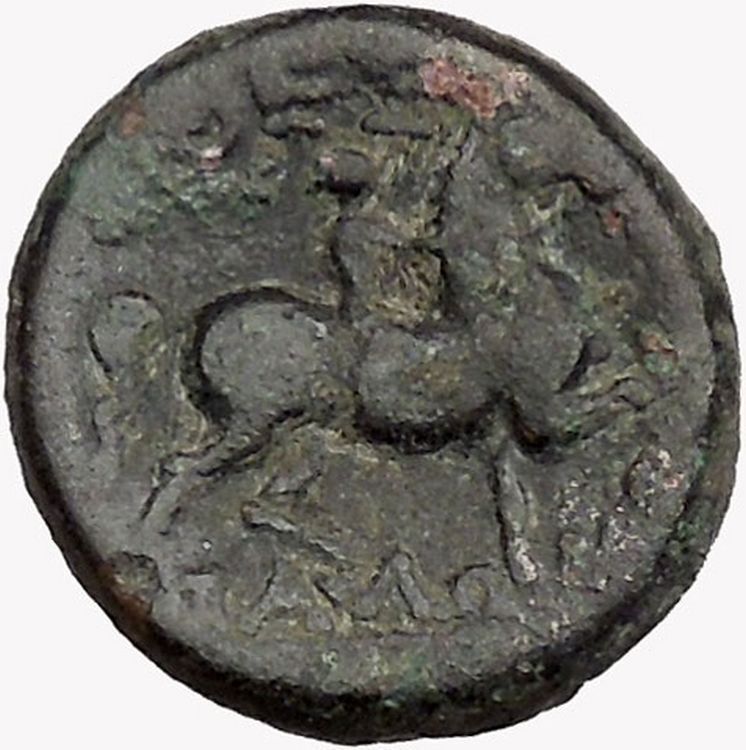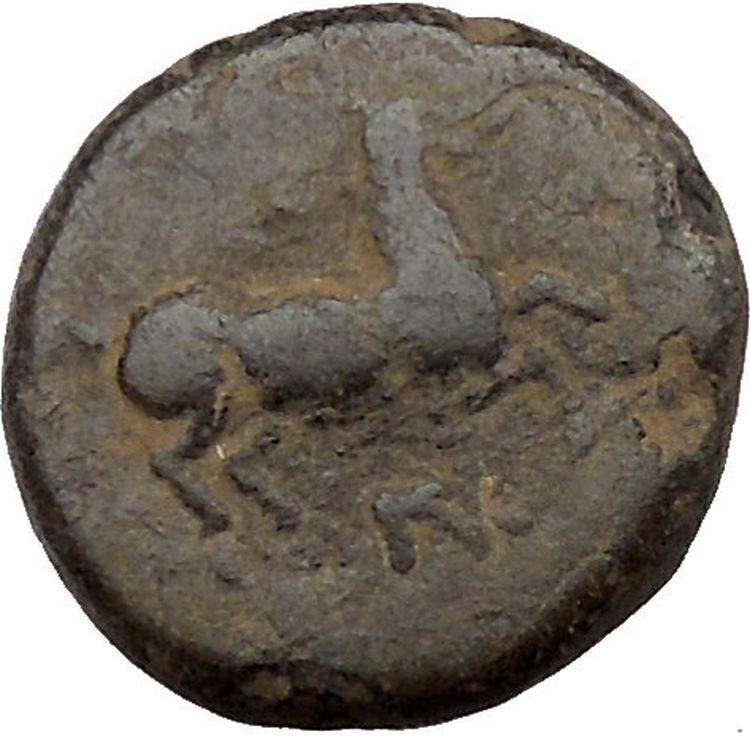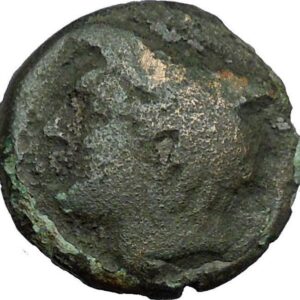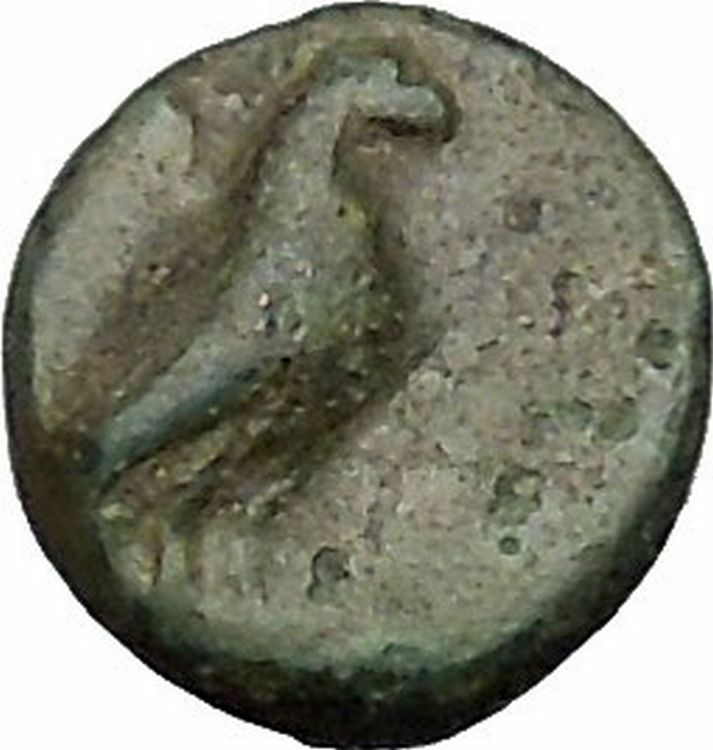|
Greek –
Ptolemaic Kingdom of Egypt
Ptolemy Apion – King of Kyrenaika circa 104-96 B.C.
Bronze Chalkous 13mm (3.20 grams) Kyrene mint
Reference: Svoronos 1845 (Ptolemy XIII–Alexandreia); Asolati 113; SNG Copenhagen 685-90 (Uncertain mint in Cyprus).
Diademed head of Zeus-Ammon right.
Headdress of Isis.
You are bidding on the exact item pictured, provided with a Certificate of Authenticity and Lifetime Guarantee of Authenticity.
.jpg/220px-Naples_Archaeology_Museum_(5914186263).jpg) Ptolemy Apion or simply known as Apion (Ancient Greek: Πτολεμαῖος Ἀπίων; between 150 BC and 145 BC – 96 BC) was the last Greek King of Cyrenaica who separated it from the Ptolemaic Kingdom of Egypt, and in his last will bequeathed his country to Rome.[1] He was a member of the Ptolemaic dynasty. Ptolemy Apion or simply known as Apion (Ancient Greek: Πτολεμαῖος Ἀπίων; between 150 BC and 145 BC – 96 BC) was the last Greek King of Cyrenaica who separated it from the Ptolemaic Kingdom of Egypt, and in his last will bequeathed his country to Rome.[1] He was a member of the Ptolemaic dynasty.
Ptolemy was the son of the Greek prince, King of Cyrene and future Pharaoh of Egypt Ptolemy VIII Physcon and his third wife, Eirene (Irene). Ptolemy’s paternal uncle was the Pharaoh Ptolemy VI Philometor and his paternal aunt was the princess and queen Cleopatra II of Egypt. His paternal grandparents were Pharaoh Ptolemy V Epiphanes and Queen Cleopatra I of Egypt, who was one the Greek princesses of the Seleucid Empire.
Ptolemy’s mother, Eirene (Irene), may actually have been named Ithaca, according to the Roman Jewish historian Josephus. Little is known of Eirene’s origins, apart from the fact she came from Cyrenaica. She was a mistress of Physcon’s and was among his concubines. Eirene served as Physcon’s mistress from 150 BC til 127 BC. Eirene accompanied Physcon in 145 BC to Egypt when he became pharaoh and succeeded his brother Ptolemy VI.
Ptolemy was most probably born in Cyrene, the capital of Cyrenaica, but was raised and educated in his father’s court in Egypt.[citation needed] Until 116 BC, he most probably lived in Egypt. Ptolemy never held a royal Egyptian title. In 116 BC, Ptolemy’s father had died. From Physcon’s will, Ptolemy inherited Cyrenaica and, in that year, ascended the throne without any political opposition.
Little is recorded of Ptolemy’s reign of Cyrenaica. Ptolemy died in 96 BC and he implemented the terms of his father’s will for Cyrenaica. He never married and had no heirs. In Ptolemy’s will, he left Cyrenaica and his ancestral royal estates to the rule of the Roman Republic. Physcon had planned this for Cyrenaica after Ptolemy’s death.
Ptolemy’s ancestral estates were occupied by locals in the 1st century. The occupiers of the estates needed assistance from the Roman emperor Nero, to legalise the land title through their occupations, thereby vesting ownership in them.
The Ptolemaic Kingdom was a Hellenistic kingdom based in Egypt. It was ruled by the Ptolemaic dynasty which started with Ptolemy I Soter’s accession after the death of Alexander the Great in 323 BC- and which ended with the death of Cleopatra VII and the Roman conquest in 30 BC.
The Ptolemaic Kingdom was founded in 305 BC by Ptolemy I Soter, who declared himself Pharaoh of Egypt and created a powerful Hellenistic dynasty that ruled an area stretching from southern Seleukid Kingdom to Cyrene and south to Nubia. Alexandria became the capital city and a major center of Greek culture and trade. To gain recognition by the native Egyptian populace, they named themselves the successors to the Pharaohs. The later Ptolemies took on Egyptian traditions by marrying their siblings, had themselves portrayed on public monuments in Egyptian style and dress, and participated in Egyptian religious life. The Ptolemies had to fight native rebellions and were involved in foreign and civil wars that led to the decline of the kingdom and its final annexation by Rome. Hellenistic culture continued to thrive in Egypt throughout the Roman and Byzantine periods until the Muslim conquest.

|





.jpg/220px-Naples_Archaeology_Museum_(5914186263).jpg) Ptolemy Apion or simply known as Apion (Ancient Greek: Πτολεμαῖος Ἀπίων; between 150 BC and 145 BC – 96 BC) was the last Greek King of Cyrenaica who separated it from the Ptolemaic Kingdom of Egypt, and in his last will bequeathed his country to Rome.[1] He was a member of the Ptolemaic dynasty.
Ptolemy Apion or simply known as Apion (Ancient Greek: Πτολεμαῖος Ἀπίων; between 150 BC and 145 BC – 96 BC) was the last Greek King of Cyrenaica who separated it from the Ptolemaic Kingdom of Egypt, and in his last will bequeathed his country to Rome.[1] He was a member of the Ptolemaic dynasty.





